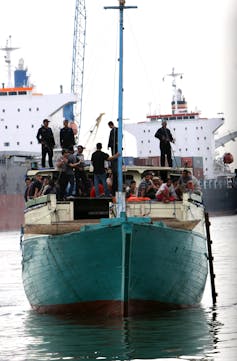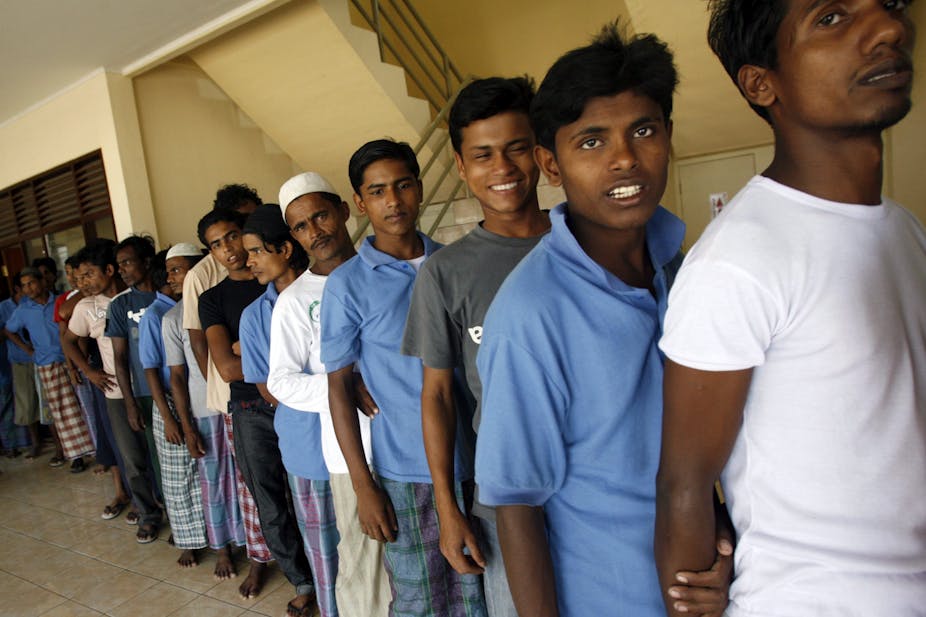As we waited for the release of the Houston panel’s report on asylum seekers yesterday, I saw a mixture of high hopes and low expectations from those in attendance at the Parliament House briefing room.
The high hopes were for this report to rise above seemingly the only “solution” proposed – offshore processing. The low expectations were that the report was going to endorse bilateral offshore processing such as the Australia-Malaysia Memorandum (overruled by the High Court); tout the return of temporary protection visas; and make the usual noises about “engaging the region” in a burden sharing framework, but deliver no specific guidance on how to achieve this.
Much has since been made of the panel’s recommendations to re-open processing centres at Nauru and Manus Island and the restriction on family reunion visas for those who arrive by boat.
But as an international relations scholar who has worked on the crisis of regional irregular migration, I am going to discuss the report’s recommendations for “a regional cooperation framework”. And there is good news here.
For the first time there is a realistic framework for engaging the region on the table, and we can begin the process of establishing a sustainable burden-sharing arrangement for asylum seekers.
Breaking the circuit
The panel has made 22 recommendations that, according to its terms of reference, attempt to provide a “circuit breaker”. It is hoped this will stop the passage of unsafe boats that has seen 604 people lose their lives since October 2009.

As many will have seen in the media briefing, the advice of the panel was that the whole package should be adopted, and individual elements not be “cherry-picked” from it. As each of the experts - Angus Houston, Michael L’Estrange and Paris Aristotle - argued, the panel’s preferred approach will only have the desired effect if the whole package is accepted.
This, in my opinion, is particularly vital when it comes to the recommendations on the increased humanitarian intake program, which is crucial to facilitate further regional engagement, and in turn, crucial for serious negotiations around regional processing.
To be blunt, a succession of Australian governments has offered very little to the Asian region to “bring them to the table” and see shared benefit in a negotiated asylum and processing agreement. As the report outlines:
Australia needs to engage in, and help facilitate, the development of practical strategies with regional states on protections, registration, processing of asylum claims and provision of durable outcome.
The road to cooperation
There are several key points in the panel’s report that interrelate in significant ways to facilitate regional cooperation.
First, the immediate increase in humanitarian intake from 13,759 in 2011-12 (a figure that has changed little from 11,902 in 1996-97) to an annual intake of 20,000, and a further increase to 27,000 after five years.
Second, the intake increase should immediately be allocated to assist in alleviating the high asylum load in the South East Asian region – Indonesia and Malaysia in particular – where the positive findings for the refugee caseload is greater than 90%. The panel recommends 3,800 places dedicated for resettlement from regional countries in South East Asia, with the anticipation this quota will also include caseloads from the Middle East region.
Third, this increase is not intended to remove Australia’s existing refugee resettlement quota committed to the UNHCR. The regional resettlement program recommended by the Panel does not remove places from those under the UNHCR global resettlement scheme. The 3 800 places come from the additional 6,000-7,000 recommended intake. Again, this refocus of the humanitarian program is designed to assist with regional resettlement needs and cooperative arrangements.
Finally, a humanitarian “refocus” on the immediate region to alleviate the region’s caseload will feed the “good will” needed to invigorate wider regional cooperation on protection and asylum.
More money, fewer problems
It is also worth highlighting further details on the regional capacity building package.
These include doubling investment in regional processing to $140 million to assist states in the region in relation to “protections, registrations, processing of asylum claims and provision of durable outcomes”. This assistance package is to be jointly managed by the immigration department and AusAID.

This represents a significant extension of Australia’s regional engagement beyond simple deterrence and towards building regional capacity to respond to the economic and social pressures that confront asylum seekers.
The extra investment would be also directed to support the UNHCR presence in the region, though further details here would be appreciated. The UNHCR is particularly crucial in Asia. Its offices hold the primary protection burden in a region where there are few national frameworks in place to provide such protection.
Finally, the panel’s proposal for further research to examine the effects of government policy and better understand the causes of peaks and troughs in refugee flows should be welcomed. Its consultation process has created avenues for collaborative research.
You get what you give
We know that deterrence alone is not a viable strategy and that policy should focus on the appropriate balance of incentives and disincentives.
We know our humanitarian intake needs to increase to accommodate need in the region and beyond. Given the UNHCR difficulty in achieving more signatures to the Refugee Convention, options such as the Malaysian agreement may become the future bilateral and multilateral arrangements in the region.
We also know that all the previous disincentives under various governments have eventually expired due to unfeasible ongoing cost – at the humanitarian, political and financial levels.
The panel has made an important contribution to the debate about a regional framework: to gain we must give.

